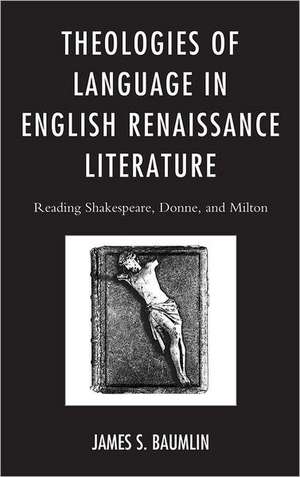Theologies of Language in English Renaissance Literature
Autor James S. Baumlinen Limba Engleză Hardback – 30 mai 2012
Preț: 788.38 lei
Preț vechi: 1079.98 lei
-27% Nou
Puncte Express: 1183
Preț estimativ în valută:
150.88€ • 156.93$ • 124.56£
150.88€ • 156.93$ • 124.56£
Carte tipărită la comandă
Livrare economică 14-28 aprilie
Preluare comenzi: 021 569.72.76
Specificații
ISBN-13: 9780739169605
ISBN-10: 0739169602
Pagini: 259
Dimensiuni: 152 x 229 x 28 mm
Greutate: 0.64 kg
Editura: Rowman & Littlefield
ISBN-10: 0739169602
Pagini: 259
Dimensiuni: 152 x 229 x 28 mm
Greutate: 0.64 kg
Editura: Rowman & Littlefield
Notă biografică
Descriere
James S. Baumlin's Theologies of Language in English Renaissance Literature offers a revisionist history of discourse, taking Shakespeare, Donne, and Milton as its touchstones. Their works mark stages in die Entzauberung or "disenchantment," as Max Weber has termed it: that is, in the "elimination of magic from the world."
